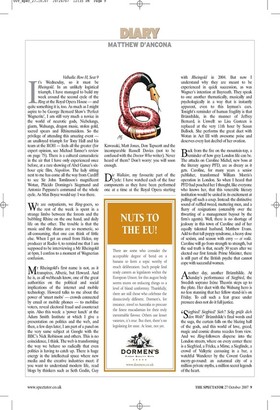DIARY
MATTHEW D'ANCONA Valhalla: Row H, Seat 9 1 t's Wednesday, so it must be Rheingold. In an unlikely logistical triumph, I have managed to build my week around the second cycle of the Ring at the Royal Opera House — and quite something it is, too. As much as I might aspire to be George Bernard Shaw's 'Perfect Wagnerite', I am still very much a novice in the world of neurotic gods, Niebelungs, giants, Walsungs, dragon music, stolen gold, sacred spears and Rhinemaidens. So the privilege of attending this amazing event — an unalloyed triumph for Tony Hall and his team at the ROH — feels all the greater (for expert opinion, see Michael Tanner's review on page 75). There is a cultural camaraderie in the air that I have only experienced once before, at a rare showing of Abel Gance's sixhour epic film, Napoleon. The lady sitting next to me has come all the way from Cardiff to see Sir John Tomlinson's magnificent Wotan, Placid° Domingo's Siegmund and Antonio Pappano's command of the whole cycle. As Max Boyce would say: I was there.
We are outpatients, we Ring-goers, so the rest of the week is spent in a strange limbo between the forests and the bubbling Rhine on the one hand, and daily life on the other. The trouble is that the music and the drama are so mesmeric, so all-consuming, that one can think of little else. When I get an email from Helen, my producer at Radio 4, to remind me that I am supposed to be interviewing a Mr Rheingold at 6pm, I confess to a moment of Wagnerian confusion.
Mr Rheingold's first name is not, as it transpires, Alberic, but Howard. And he is, as all webheads know, one of the great authorities on the political and social implications of the internet and mobile technology. Howard talks to me about the power of 'smart mobs' — crowds connected by email or mobile phones — to mobilise voters, reveal electoral fraud and counteract spin. Also this week: a 'power lunch' at the Adam Smith Institute at which I give a presentation on politics and the web, and then, a few days later, I am part of a panel on the very same subject at Google with the BBC's Nick Robinson and others. This is no coincidence, I think. The web is transforming the way we behave so radically that even politics is having to catch up. There is huge energy in the intellectual space where new media and the creative industries meet: if you want to understand modern life, read blogs by thinkers such as Seth Godin, Guy Kawasaki, Matt Jones, Don Tapscott and the incomparable Russell Davies (not to be confused with the Doctor Who writer). Never heard of them? Don't worry: you will soon enough.
Die Walkiire, my favourite part of the Cycle: I have watched each of the four components as they have been performed one at a time at the Royal Opera starting with Rheingold in 2004. But now I understand why they are meant to be experienced in quick succession, as was Wagner's intention at Bayreuth. They speak to one another thematically, musically and psychologically in a way that is instantly apparent, even to this layman's ears. Tonight's reminder of human fragility is that Brannhilde, in the manner of Jeffrey Bernard, is Unwell: so Lisa Gasteen is replaced at the very 11th hour by Susan Bullock. She performs the great duet with Wotan in Act III with awesome poise and deserves every last decibel of her ovation.
Back from the fire on the mountain-top, a reminder of how grey London life can be. The attacks on Caroline Michel, new boss at the literary agency RFD, are as dreary as it gets. Caroline, for many years a senior publisher, transformed William Morris's operation in London. So when I heard that PhD had poached her I thought, like everyone who knows her, that this venerable literary institution would be united in its excitement at pulling off such a coup. Instead: the distinctive sound of ruffled tweed, muttering men, and a flurry of resignations (ostensibly over the thwarting of a management buyout by the firm's agents). Well, there is no shortage of jealousy in this town of Caroline and of her equally talented husband, Matthew Evans. Add to that tall poppy syndrome, a heavy dose of sexism, and season with envy — et voila. Caroline will go from strength to strength, but the sad truth is that, nearly 30 years after we elected our first female Prime Minister, there is still part of the British psyche that cannot cope with successful women.
Arsiother day, another Briinnhilde. At unday's performance of Siegfried, the Swedish soprano Irene Theorin steps up to the plate. Her duet with the Walsung hero is no less stunning that her fellow stand-in's on Friday. To call such a feat grace under pressure does not do it full justice.
Ciegfried! Siegfried! Sieh'! Selig grid3t dich ■ .3 den Weib!' Brannhilde's final words end the saga, the curtain falls on the blazing hall of the gods, and this world of love, greed, magic and cosmic drama recedes from view. And we Ring-followers disperse into the London streets, where on every corner there is a Siegfried, a Fricka, a Mime, a Sieglinde, a crowd of Valkyrie carousing in a bar, a watchful Wanderer by the Covent Garden merry-go-round: an autumnal city of a million private myths, a million secret legends of the heart.


































































 Previous page
Previous page